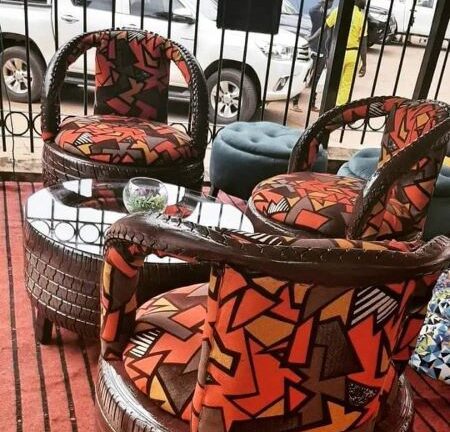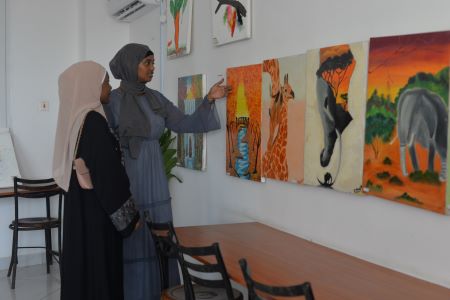Che Azenyui Bruno
Ayeah Nini Leonette is a Cameroonian social entrepreneur, music artist and song writer. She is the Founder and CEO of Nini Recycling: A Cameroonian household furniture and design enterprise specialized in the production of household furniture from used car tires and iron objects. Leonette’s venture into household furniture manufacturing began in 2020 when out of curiosity and desire to make a living for herself she decided to test out her first set of designs first with members of family.

Ayeah Nini Leonette
With support from her brother who himself became one of her very first loyal customers, Leonette produced her first set of designs all of which she marketed back to the brother. The feedback she received from other potential customers after the delivery of her first set of designs spurred her to invest more of her time, energy and resources into turning this passion into a profitable enterprise.
“I produced a few more designs first for my neighbours and then for a few other persons in the neighbourhood and before I knew it I was already in business.” she said.
Born and raised in Bamenda: a typical Cameroonian city battling with waste disposal, Leonette says she particularly finds pleasure in knowing that out of the desire to create value for herself and her community, she has been able to turn a childhood passion into a profitable social enterprise initiative that is now more than just a source of employment for her and many others but has also become a worthwhile contributing initiative to the global campaign against climate change and environmental pollution

“At Nini Recycling, we make good out of what you will typically want to refer to as waste tires to produce low cost, high quality and long lasting chairs, tables and even glass stands. Good quality furniture is one of the most expensive items you would find in a typical African household today. A good number of our households in the continent depend on wood manufactured furniture for their homes and this tendency often times tends to affect the environment negatively in terms of deforestation and all. My vision is that of a world in which households will be able to have the finest quality furniture for their comfort and beauty without having to depend largely on wood and wood products for it.”
Today, Leonette’s designs sell in almost all urban and semi-urban markets in Cameroon with the greater bulk of her buying customers coming largely from Douala, Yaounde, Bamenda, Limbe and Kumba.

“By our very activity, we rid the streets of all dumps of abandoned car tires, we protect the environment, we combat deforestation by reducing human overdependence on wood for furniture and most important of all, we provide households with the comfort, beauty and elegance that they deserve” she said.
Customers for Leonette’s designs generally range from household consumers, offices, to all lovers of good quality furniture design and class
“We serve people of all income levels and socio-economic status. Our products and prices are customizable in such a way as to reflect the variety in income levels for all our customers. We are more of a community centred enterprise than just a group of people pursuing wealth and fame at any cost. Regardless of your income level or socio-economic status, you can always find a product or two at Nini recycling that matches your budget and domestic expectations,” She explained.
James Mancho, a Limbe Based real estate agent and regular consumer of Nini products says he is in most cases attracted largely by the beauty and class that comes with Nini Designs
“I love the beauty, the comfort and style that comes with her products. They are affordable and sell at a far less cost than wood-manufactured furniture. Leonette and her team seem to have a comprehensive understanding of what makes for ideal domestic furniture these days and that’s why I patronize them every now and then” he said.
As a singer, song writer and single mother, Leonette admits that shuttling between domestic and career responsibilities sometimes does require that she engages extra hands at some stages of her business.
“I have a team of two full time and about six-part time designers who help in putting together the designs of our products. Even with that there are still days I have to stay up until about 2am in order to accomplish specified tasks. On several occasions, I have to appeal to my friends and neighbors to watch over my son for some time while I work on client designs especially when I have urgent deadlines to meet.”
When not designing, Leonette says she spends the other half of her daily schedule weaving together musical notes some of which eventually become content for a new soundtrack for her musical career.
Leonette is based in the Cameroonian seaside resort city of Limbe, a city which just like her childhood city of Bamenda and other towns in Cameroon is currently battling with the daily challenges of waste disposal and environmental protection.

A 2015 Study by Din-Louis Georges of the Pan African Institute for Development West Africa (PAID-WA) revealed that Limbe alone in Cameroon generates about 7,300 tonnes of waste each year with an average of 20 tonnes per day. Health experts have regularly raised concerns about the growing rate of waste generation in the city especially as such waste often tends to pollute the water bodies upon which the people depend for fish and household utilization. Much of Limbe’s waste often finds itself in the ocean, causing harm to not just the sea life, but the town’s residents too. With a 28km shoreline, policing the waste dumping process in Limbe has remained a near-impossible task for municipal authorities.
According to a 2019 publication by the International Journal of Recent Technology and Engineering (IJRTE), The main impacts of tires on the environment and human health are the degradation of natural resources, environmental degradation, and deterioration of human health. A Further study by Pieter Jan Kole of the Open University in the Netherlands reveals that car tires account for as much as 10% of overall micro-plastic waste in the world’s oceans.




